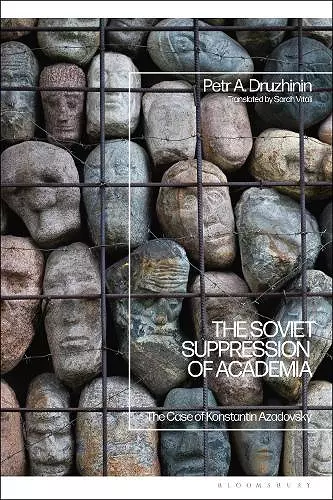The Soviet Suppression of Academia
The Case of Konstantin Azadovsky
Petr A Druzhinin author Sarah Vitali translator
Format:Hardback
Publisher:Bloomsbury Publishing PLC
Published:28th Jul '22
Currently unavailable, and unfortunately no date known when it will be back

An exploration of the relationship between intellectual and state power in Soviet Russia.
Recently, scholarship has paid increasing attention to the Soviet dissident movement that emerged in the mid-20th century; but what, Petr A. Druzhinin asks, happened to those academics who did not form part of this circle? Through its intimate portrayal of the persecution of non-dissident literary scholar Konstantin Azadovsky, The Soviet Suppression of Academia sheds new light on the relationship between power and culture in Soviet Russia.
Based on rare access to KGB materials and other sources, this book traces Azadovsky’s persecution from the 1960s, when he refused to become a KGB informant, to his arrest on trumped-up drug charges and imprisonment in a labour camp in the 1980s, to his struggle for rehabilitation through the early 1990s. Here, for the first time in English, one of the KGB’s secret operations against a prominent intellectual is revealed in full, horrific detail. By telling the fascinating story of an individual's struggle with the powerful state machine, this book provides much-needed insight into the experience of life under KGB monitoring and repression and adds nuance to ongoing debates about the relationship between Soviet intellectuals and the state.
As too many in modern Russia are also discovering, repression has a momentum of its own. Petr Druzhinin's meticulous exploration of the case of the Azadovskys follows this dark path through forty years of Russian history through to the post-Soviet 1990s. * Mark Galeotti, Honorary Professor of Slavonic & East European Studies, University College London, UK *
This fascinating account of the ordeal suffered by Konstantin Azadovsky, an eminent literary scholar, in the 1980s is a reminder of the cruelty and arbitrariness of the Soviet Communist regime. Anyone today who feels nostalgic about the Soviet era ought to read this book. Azadovsky was a cautious person, but that did not prevent him from being targeted by the Soviet KGB, which orchestrated his arrest and imprisonment on trumped-up charges. Like Joseph K. in Kafka’s The Trial, Azadovsky was thrust into a faceless bureaucratic morass and punished for crimes he did not commit. Petr Druzhinin recounts this appalling episode in vivid detail, showing how the Soviet repressive apparatus enforced the whims of an odious dictatorship. Much has changed in Russia since the 1980s, but unfortunately the travails Azadovsky experienced four decades ago are disturbingly reminiscent of the way opposition figures nowadays in Russia have been repressed under Vladimir Putin’s autocratic rule. * Mark Kramer, Director of the Cold War Studies Project, Harvard University, USA *
This book provides a close-up view of what it was like to live under continuous KGB surveillance and repression, and sheds new light on the tenuous relationship between the state and intellectuals during the Soviet period. * International Journal of Russian Studies *
This rich and well-argued study makes a significant contribution to the literature through a painstaking reconstruction of an important case, providing insights into late Soviet repression that deserve the attention of the field. * The Journal of Modern History *
ISBN: 9781350136137
Dimensions: 162mm x 236mm x 22mm
Weight: 580g
280 pages